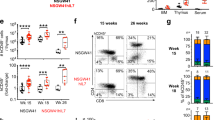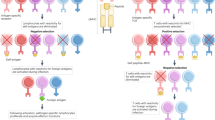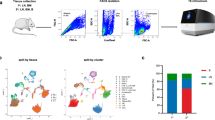Abstract
A FOETUS carries antigens that are foreign to its mother, but the mother does not routinely reject it as an allograft. The fate of the foetus may thus depend on preventing or blocking the ability of the immune system of the mother to respond to alien foetal antigens. Clearly, this is a complex process which may involve several mechanisms1–6. One mechanism implicates the active blocking of the immunological capacity of the mother to respond to her foetus5,6. We reported previously that T lymphocytes taken from cord blood of human newborns inhibits their own mothers' lymphocytes from entering mitosis6,7. We have studied the subpopulations of T lymphocytes in human cord blood and ascertained their ability to inhibit both the division of lymphocytes and the production of immunoglobulin by lymphocytes obtained from the mother. We report here that active T suppressor cells occur in cord blood, that these T suppressor cells bear IgG receptors; and that the T cells bearing IgG receptors inhibit both mitosis of and immunoglobulin production by lymphocytes from the mother.
This is a preview of subscription content, access via your institution
Access options
Subscribe to this journal
Receive 51 print issues and online access
$199.00 per year
only $3.90 per issue
Buy this article
- Purchase on Springer Link
- Instant access to full article PDF
Prices may be subject to local taxes which are calculated during checkout
Similar content being viewed by others
References
Faulk, W. P. & Temple, A. Nature 262, 799–802 (1976).
Goodfellow, P. N., Barnstable, C. J., Bodmer, W. F., Snary, D. & Crumpton, M. J. Transplantation (in the press).
Jenkinson, E. J. & Billington, W. D. Transplantation 18, 286–289 (1974).
Currie, G. A., van Doorninck, W. & Bagshawe, K. D. Nature 219, 191–192 (1968).
Hellström, K., Hellström, I., & Braun, J. Nature 224, 914–915 (1969).
Olding, L. B. & Oldstone, M. B. A. Nature 249, 161–162 (1974).
Olding, L. B. & Oldstone, M. B. A. J. Immun. 116, 682–686 (1976).
Ferrarini, M., Moretta, L., Abrile, R. & Durante, M. L. Eur. J. Immun. 5, 70–72 (1975).
Moretta, L., Webb, S. R., Grossi, C. E., Lydyard, P. M. & Cooper, M. D. J. exp. Med. (in the press).
Olding, L. B., Benirschke, K. & Oldstone, M. B. A. Clin. Immun. Immunopath. 3, 79–89 (1974).
Moorhead, P. S., Nowell, P. C., Mellman, W. J., Battips, D. M. & Hungerford, D. A. Expl Cell Res. 20, 613–618 (1960).
Waldmann, T. A. et al. Lancet ii, 609–613 (1974).
Hayward, A. R. & Lawton, A. R. J. Immun. (in the press).
Masson, P. L., Delire, M. & Cambiaso, C. L. Nature 266, 542–543 (1977).
Olding, L. B., Murgita, R. A. & Wigzell, H. J. Immun. (in the press).
Lerner, R. A., McConahey, P. J., Jansen, I. & Dixon, F. J. J. exp. Med. 135, 136–149 (1972).
Author information
Authors and Affiliations
Rights and permissions
About this article
Cite this article
OLDSTONE, M., TISHON, A. & MORETTA, L. Active thymus derived suppressor lymphocytes in human cord blood. Nature 269, 333–335 (1977). https://doi.org/10.1038/269333a0
Received:
Accepted:
Published:
Issue Date:
DOI: https://doi.org/10.1038/269333a0
This article is cited by
-
Subpopulations of T lymphocytes in patients with chronic active liver disease
La Ricerca in Clinica e in Laboratorio (1982)
-
Suppression of human T-cell colony formation during pregnancy
Nature (1978)
Comments
By submitting a comment you agree to abide by our Terms and Community Guidelines. If you find something abusive or that does not comply with our terms or guidelines please flag it as inappropriate.



